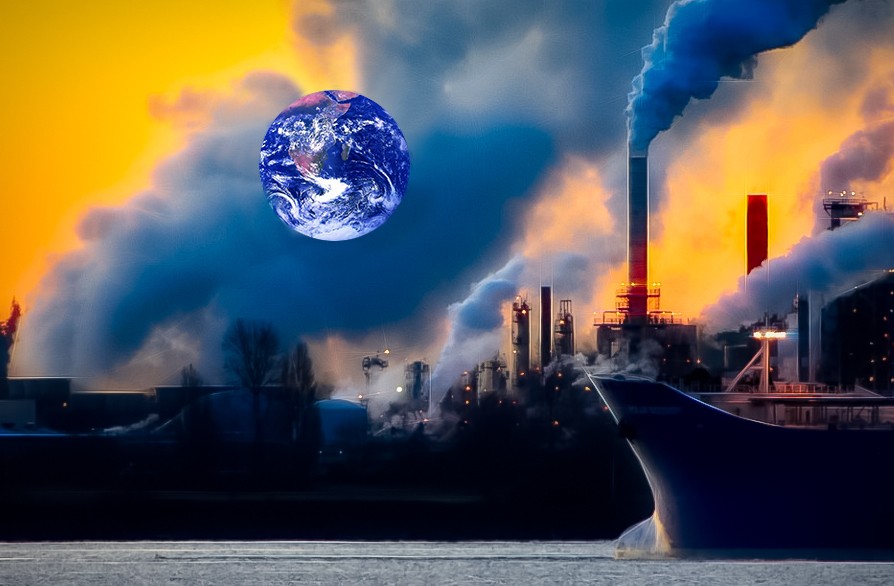
[ad_1]
This past summer, when Phoenix temperatures swelled above 110 in a record breaking heat wave that lasted for 31 days, Kathleen Maxwell didn’t open her windows from March through September. She wasn’t able to take her dog for a walk for four months.
“It’s always been really hot here, but nothing like this past summer,” she said. “I was seriously scared. Like, what if this doesn’t end and this is how it’s going to be?”
Writer and naturalist Bruce Menin, who works for the Aububon Society in Massachusetts, says if people don’t believe news reports about climate change they have only to look to nature to see how things are dramatically changing.
“More storms, floods, hurricanes — even the birds are changing their migration patterns to respond to milder weather. The blackbirds here used to be the first real bird of spring — now they are overwintering flocks.”
Conversations about the weather are no longer mere space-fillers in otherwise vapid communications. These days, the person you are talking to is more likely than not to have experienced some extreme and frightening weather over the course of the past few years. So talking about the weather today often means talking about extreme weather and climate change, topics that can be personally traumatizing while often politically sensitive.
Polling
As the link between a changing climate and weather patterns becomes more obvious to the average individual, recent polling conducted by the Associated Press-NORC Center for Public Affairs Research reveals that most Americans today have experienced extreme weather associated with climate change.
According to the Associated Press:
About 9 in 10 Americans (87%) say they have experienced at least one extreme weather event in the past five years — including drought, extreme heat, severe storms, wildfires or flooding — up from 79% who said that just a few months ago in April. And about three-quarters of those believe climate change is at least partly to blame.
A recent CNN poll conducted by SSRS shows over half of those polled are concerned about extreme weather impacts: 73% of those polled are in favor of the federal government acting to cut “the country’s planet-warming pollution in half by the end of the decade.”
Gen Z and Climate Change
Gen Z is far and away the generation most concerned with climate change and most likely to recognize the link between weather extremes and a changing climate, according to the Pew Research Center. In fact, polls show 76% of US Gen Zers view climate change as one of their biggest concerns, with 37% saying it is their top concern. In a 2021 global study, 45% of Gen Zers said anxiety over climate change was having an impact on their daily lives.
From an APCO Worldwide article Rising Temperatures, Rising Stress: The Climate Anxiety Dilemma and Its Impact on Gen Z in the Workplace:
Gen Z’s heightened awareness of climate change is partly attributed to being digital natives, as their strong social media literacy keeps them connected to global events, including climate disasters. This exposure, and the warnings that the corporate world is not acting swiftly enough on climate issues, have led to feelings of frustration and disillusionment among Gen Z. As a result, these emotions have had an impact on their career decision-making. A KPMG survey found that 20% of Gen Z job seekers rejected offers due to companies’ perceived misalignment with their ESG values, highlighting Gen Z’s willingness to prioritize environmental and social values over personal economic considerations. And while the emphasis on purpose is significant, it can also result in reduced job satisfaction and motivation among Gen Z workers when employers do not adequately address climate change.
When asked about their overall concerns about climate change:
- Boomers: 72% concerned
- Gen X: 74% concerned
- Millennials 77% concerned
- Gen Z: 82% concerned; 47% very concerned.
According to the Fast Company Harris poll:
When it comes to extreme weather specifically, the consensus was clear, with 77% millennials and Gen X, 76% of Gen Z, and 75% of boomers all saying they were concerned about atypical or unseasonable weather. Similarly, a majority of each group reported that they are more concerned about extreme weather now than they were a year ago, with Gen Z leading the category at 65%.
Politicizing the Weather and Climate Change
The Pew Research Center conducted interviews recently with individuals to determine Why Some Americans Do Not See Urgency on Climate Change, finding that most who participated in the study objected to the language which describes climate change as a crisis. They doubted the motives of people referring to the urgency of the climate situation.
Interviewees widely rejected the national news media as a credible source for climate information. They see these outlets as presenting information that suits their own agendas. Interviewees generally expressed greater openness toward hearing from scientists on climate change because of their subject matter expertise. Still, participants stressed the importance of hearing factual statements from scientists rather than beliefs that may be shaped by their own political leanings or their research funders.
On policy, interviewees were open to government efforts to improve environmental quality, including air and water quality – especially when these efforts were at the local level. The conversations underscore areas of common ground around environmental protection, regardless of Americans’ level of concern about climate change.
The Hill reports that climate change first became a ‘wedge issue’ in 2001 when Republican pollster Frank Luntz encouraged planting doubt in the minds of voters about the science behind climate change.
Luntz advised Republicans to avoid using the words global warming and opt instead for climate change. They were instructed to “make the lack of scientific certainty a primary issue in the debate.” This intimately linked Republicans to the fossil fuel industry and gave rise to the ensuing disavowal of climate science and scientists. Along with a refusal to recognize the role fossil fuels play in rising temperatures worldwide.
Not many are aware of just how much Congress backs dirty energy:
Americans supported fossil fuel production and consumption with direct and indirect subsidies totaling $757 billion last year, far more than the IRA’s support for clean and unlimited energy from sunlight, wind, and other renewable resources. Put another way, every man, woman and child in America paid nearly $2,230 in 2022 to help the fossil energy industry sell products that ultimately destroy homes, lives, lungs, ecosystems, biological diversity, and quality of life. That doesn’t include knock-off effects like the growing “climate insurance bubble,” where 39 million underinsured properties are at high risk of floods, wildfires, and hurricanes. Officials worry about a foreclosure crisis as insurance rates become unaffordable and weather disasters cause home values to decline.
Some Conversations
“Climate change is one of the greatest challenges humanity has ever faced. Yet many people never talk about it, let alone have the opportunity to discuss how they feel and have their voices heard by others. That needs to change.” talkclimatechange.org/…
Talk Climate Change provides an interactive climate discussion map that showcases conversations between people around the globe.
In Portugal, for example, Josh spoke with his partner Marlon:
We talked about how eating meat contributes to carbon emissions and how we should transition to a more plant-based diet. We talked about whether or not capitalism is an adequate form of ideology given the climate crisis we are facing and whether or not we should adopt something more sustainable. We talked about how there should a more top-down approach with big companies and organizations taking more proactive steps to help combat climate change. We talked about more sustainable modes of transportation and that cities should move away from cars and embrace public transit (and walking!).
In the country of Georgia, Tamar spoke with coworker Jangulashvili:
I am a Climate Pact Ambassador in Georgia working on the topics with young people including climate change and mitigation, circular economy and sustainable development and its impact on the country’s economic, social and health development. I shared my thoughts regarding community development and empowerment to make deep changes in tacking climate change and global warming, what can each country and city do to empower young generation and why it is useful for countries to turn their linear economies into circular ones. Education can play a key role to make long lasting changes, I talked about my plans as a Climate Pact Ambassador to change the mindset and skillset of young people with activities and educational programs planned ahead. Also I shared my vision how cities can be promote sustainable development to overcome local economic and social problems within their communities.
In Kingsland, Georgia, in the United States., Dana spoke with her mother:
My parents have dreamed of living in a single family home since I was in elementary school. The town where I grew up, Kingsland, is in a low-lying, coastal county. When my parents finally saved up enough money to buy a home, I urged them to move inland — I love where I grew up, but the NOAA projects that much of it will be underwater by the end of the century. My parents chose to stay. They now live in a beautiful home just up the street from where I was raised, and I visit as often as I can. Already, the backyard floods every time there is a heavy rain (which is often in this part of the world). I talk and work with my mom to figure out ways we can mitigate the potential damage. We installed a sump pump to drain out the low-lying parts of the yard. We installed gutters to control water flow. We strategically plant and garden a defense for our home. We talked about rising seas, changing floodplains, and stronger storms, and about controlling and preparing what we can.
OUR MESSAGE TO THE WORLD
Thirty percent of my home county is projected to be underwater by century’s end. You have the power to stop or slow it. I am young enough (26) to inherit the earth while the worst effects of climate change begin to set in. Whatever you are doing, you need to do more.
In a TED talk, respected climate scientist Dr. Katharine Hayhoe says conversations about climate change require that be able to listen to others so that we can understand what they value and assist them as they “connect the dots between the values they already have and why they would care about a changing climate.”
“We can’t give in to despair,” she says.
In St. Louis, MO, Jazmine spoke with James, a person she met randomly.
”We talked about hopelessness: James said “I think [governments] around the wrld are putting today’s profits ahead of their children’s futures… bc it’s not their problem, and it won’t get them elected.” We talked about deforestation, pollution, over-fishing, and loss of biodiversity We are tired of this issue falling on deaf ears. Governments around the world need to brace for the impact of what we have already done with climate change resistant crops, CO2 removal, and other scientific advancements, while simultaneously fighting to become fully carbon neutral as soon as possible. It can be done, only if YOU (world leaders) take it seriously.”
Portland, Oregon
Alexa
SPOKE WITHMy friend Hannah
WE SPOKE ABOUT
We discussed potential ecological collapse, our feelings around it, and what motivates us to keep showing up for change.
OUR MESSAGE TO THE WORLD
The youth are scared. But we are also angry and will continue to fight for this planet.
So Who IS Talking About the Weather?
From Yale Climate Communications, a December 2022 survey revealed that only 8% of Americans often engage in discussions with family and friends about climate change while 33% never discuss it.
Of all the demographic groups examined, Democrats, people with a Bachelor’s degree or higher, urban residents, Gen Z and Millennials, and Hispanic/Latino Americans are among the groups most likely to discuss global warming with family and friends (more than 40% in each group say they discuss it at least occasionally). The groups least likely to discuss global warming include Republicans, rural residents, people with a high school education or less, and people who do not identify with a party or are not interested in politics (less than 30% in each group say they discuss it with family and friends at least occasionally). Liberal Democrats (68%) are the most likely to discuss global warming, while conservative Republicans (11%) are the least likely to discuss it.
In her new book, Saving Us, Dr. Hayhoe believes conversations about climate change are integral to our becoming engaged in taking action in our personal lives.
“We want to talk about it; we just don’t know how…We have to go out and actively look for the hope that we need that will inspire us to act – and that hope begins with a conversation today.”
Kitchen Table Kibitzing is a community series for those who wish to share a virtual kitchen table with other readers of Daily Kos who aren’t throwing pies at one another. Drop by to talk about music, your weather, your garden, or what you cooked for supper…. Newcomers may notice that many who post in this series already know one another to some degree, but we welcome guests at our kitchen table and hope to make some new friends as well.
[ad_2]
Source link







